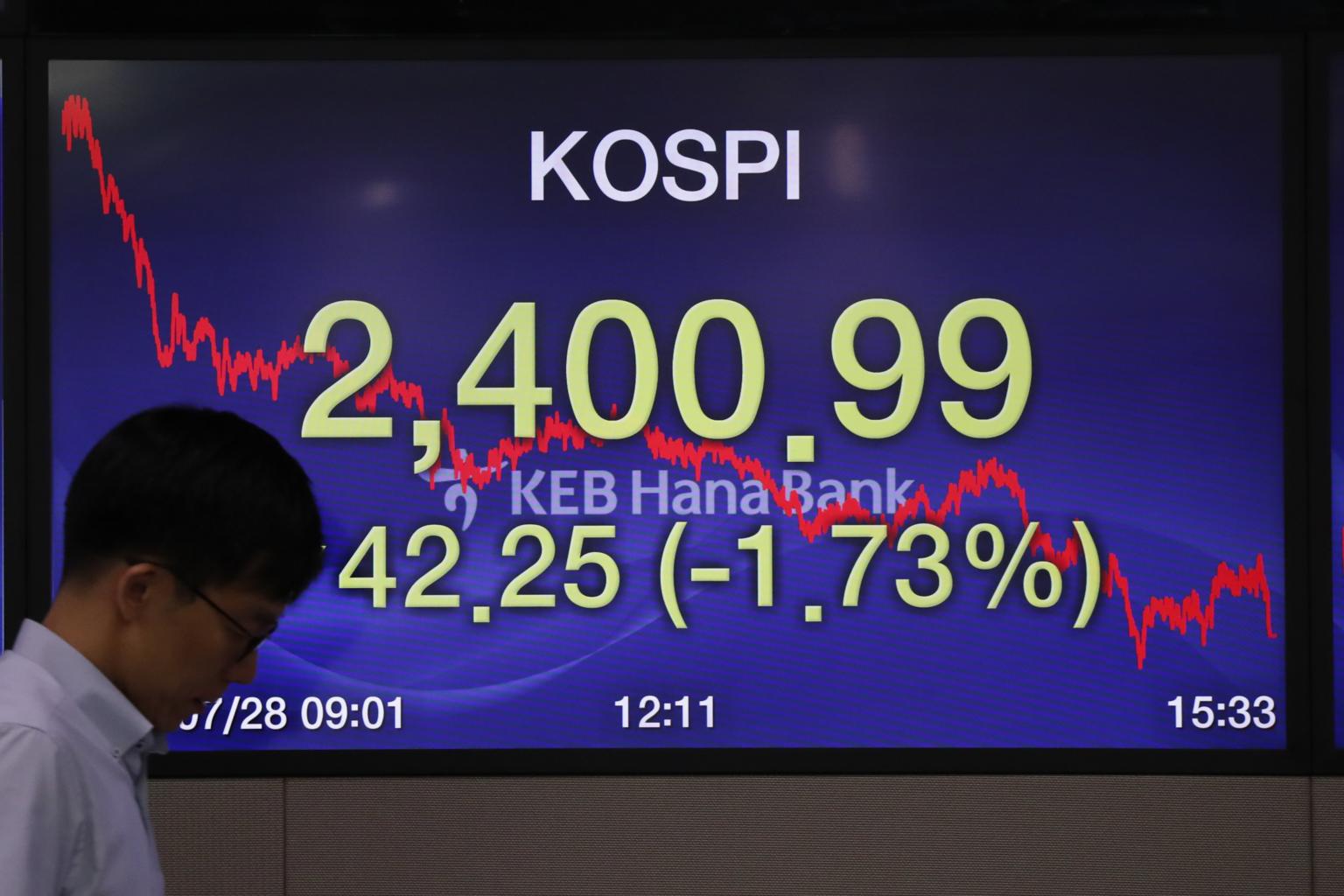Financial markets rattled by sharp increase in tensions over North Korea
Sign up now: Get ST's newsletters delivered to your inbox

A South Korean dealer works in front of a monitor at the KEB Hana Bank in Seoul.
PHOTO: EPA
Follow topic:
SEOUL (REUTERS, BLOOMBERG, AFP) - Stocks in Asia declined with U.S. equity-index futures and the South Korean currency tumbled as investors took a risk-off approach after the US and North Korea exchanged threats amid escalating tensions between the two nations.
The Australian and New Zealand dollars also came under pressure on Wednesday as the flare-up in tensions over North Korea sparked a shift to currencies considered safer harbours, most notably the Japanese yen. The Aussie dollar recoiled 0.5 per cent on its U.S. counterpart to US$0.7872 and touched a three-week trough at one point.
The yen tends to benefit during times of geopolitical or financial stress as Japan is the world's biggest creditor nation and there is an assumption investors there will repatriate funds should a crisis eventuate.
Investors took advantage of the latest volley of words to take some profit after global equities climbed to record highs this week.
Volatility gauges from the U.S. to Japan rose after President Donald Trump said in response to a Washington Post report on North Korea's nuclear capabilities that further threats from the country would be met with "fire and fury." North
Korea said it is examining an operational plan for firing a ballistic missile towards Guam.
Korea said it is examining an operational plan for firing a ballistic missile towards Guam.
"The market is realizing that economies are doing well enough for both the Fed and the ECB to remove stimulus," Ken Peng, a Hong Kong-based investment strategist at Citi Private Bank, said.
"This is going to make a lot of people a bit more nervous about liquidity. In that environment, these geopolitical headlines will have more impact, more punch. The talk is more intense than what it used to be."
Markets have been lifted from a state of inertia as geopolitical tensions have ramped up following the United Nations' decision to impose sanctions against North Korea's rapidly developing nuclear weapons programme, leading to the latest war of words between the countries.
Global powers and financial markets have long been accustomed to over-the-top rhetoric from North Korea, but the US has traditionally taken a more diplomatic stance. Trump's latest comments signalled a dramatic change in that approach, startling markets and prompting a renewed focus on the narrowing list of military and economic options at the US' disposal.
The S&P 500 Index fell to session lows Tuesday, and the CBOE Volatility Index jumped 11 per cent after Trump spoke. The comments jolted markets from a summer slumber, with U.S. assets largely little changed for most of the session. The 10-year Treasury yield rose. Crude retreated toward US$49 a barrel.
In South Korea, the Kospi index fell as much as 1 per cent. The won declined as much as 0.8 per cent, falling to a three-week low, while the cost of insuring five-year South Korean sovereign bonds from nonpayment climbed and the Kospi 200 volatility index jumped 30 per cent.
The won sank around 0.8 per cent to 1,134.4 to the dollar, its weakest since July 14.
"The won has recently been reacting quite sensitively to Trump's comments and investors' anxieties worsened today as the North came up with an aggressive response," said Jung Sung Yoon, a foreign exchange analyst at Hyundai Futures.
Foreign investors turned sellers after buying on Monday and Tuesday, with large tech shares Samsung Electronics and SK Hynix falling 1.8 per cent and 2.4 per cent, respectively. The sub-index for techs fell nearly 2 per cent.
"That's what usually happens when there is a great concern over geopolitical issues with North Korea," said Kim Ye Eun, a stock analyst at Cape Investment & Securities. Offshore investors offloaded a net 52 billion won (US$45.84 million) worth of KOSPI shares near mid-session.
But shares of defence-related companies rose, with LIG Nex1 Co Ltd up nearly 5 per cent and Firstec up 3 per cent. Washington has warned it is ready to use force if need be to stop North Korea's ballistic missile and nuclear programmes but that it prefers global diplomatic action, including sanctions.
The Hang Seng Index in Hong Kong lost 0.7 perc ent and China's Shanghai Composite Index was down 0.2 per cent.

